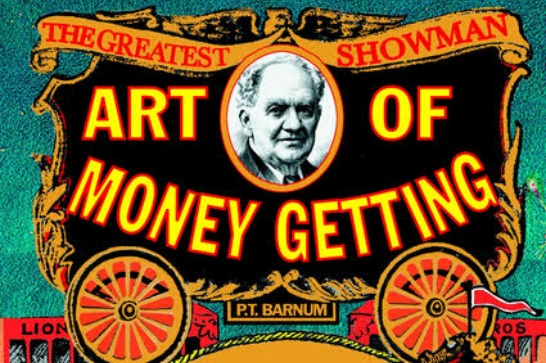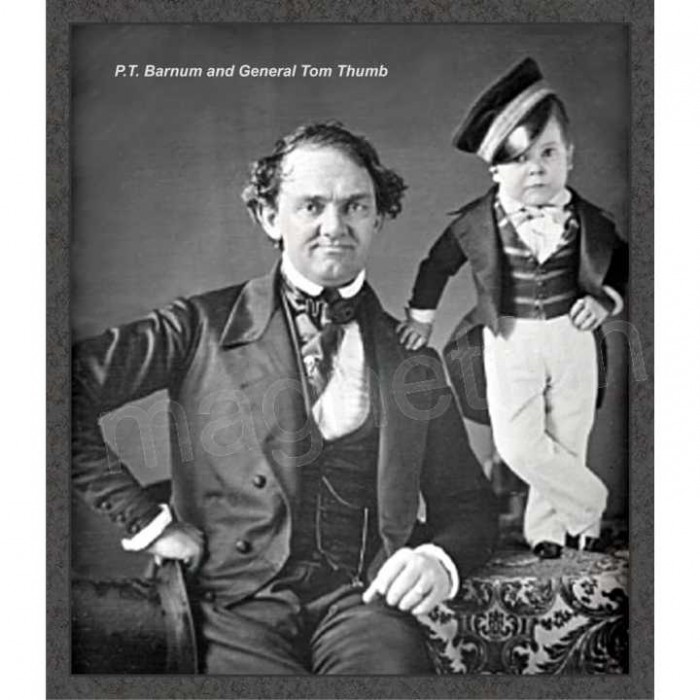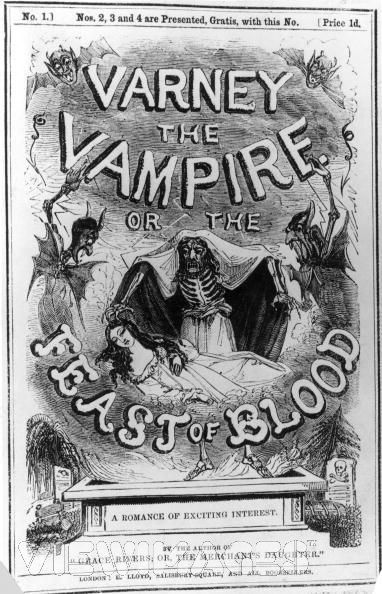P.T. Barnum’s Forgotten Book “The Art of Getting Money” – Ch. 6
We are doing a series here at BBH on The Art of Getting Money, a little-know book from P.T. Barnum wrote back in 1880.
Why? A couple reasons. First, because there’s a movie coming out December 25, 2017, starring Hugh Jackman, called The Greatest Showman.
It’s a musical about the life of P.T. Barnum.
I don’t know a lot about the movie yet, but it looks pretty good from what I’ve seen in the trailer…
The Greatest Showman – Official Trailer
P.T. Barnum’s Little-Known Book from 1880
So I thought it’d be cool to feature his little-known book The Art of Money Getting or Golden Rules for Making Money (It’s in the public domain, so it’s ok for me to post it on this site)
Some of you might not know this, but Barnum is FALSELY known for saying, “There’s a sucker born every minute,” (He actually didn’t say that.)
The second reason I thought it would be good to do this is series is because this book contains some surprisingly practical and helpful advice on how everyday people can better manage their income and increase their wealth.
The book is 137 years old, but much of the advice he gives is still applicable to all of us today.
That’s why I’ve decided to post a new segment of the book once a week here on BayBusinessHelp.com.
Today you will be able to read chapter 1 about choosing your vocation (i.e. what you do for a living).
Reminder of 4 Things Before You Read the Book
1. DISCLAIMER:
I don’t agree with everything that P.T. Barnum did during his life.
I also don’t agree with every single thing he wrote in his book.
I don’t even agree that wealth is, or should be, the primary goal in life. (There are plenty things that are more important than wealth!)
But I DO believe that all of us can benefit from learning how to better handle the money (however small or great) that flows in and out of our hands.
And this book contains some advice that I think you will find both interesting and helpful for you when it comes to how to better handle your money.
2. MY ADVICE TO READERS:
Take the good advice and leave the bad!
3. THE ONLY CHANGES I’VE MADE:
The only changes I’ve made to the text are:
- I’ve broke many of the paragraphs into smaller chunks of text to make it easier to read.
- I’ve also bolded or italicized sections of the text to help them stand out to the reader.
- I also occasionally include a modernized word to help the reader understand an old school word or phrase that Barnum uses.
- And I’ve also added some headers to the text, made some quotes stand out, and bulleted some of his points to make sections stand out for the reader.
4. SOME OF IT MIGHT BE OFFENSIVE
Because of the way spoke and thought back in the 1800’s compared to now, you shouldn’t be surprised if some of the content is offensive to our current standards and way of thinking.
If you can’t just ignore this, like I do, and you will be offended, then you probably shouldn’t read any of the posts from this series. 🙂

What We’ve Covered So Far
If you missed the previous posts in this series, you can read them here:
Introduction to The Art of Money Getting
— The Art of Money Getting – Chapter 1: Right Vocation–
— The Art of Money Getting – Chapter 2: Right Location —
— The Art of Money Getting – Chapter 3: Avoid Debt —
— The Art of Money Getting – Chapter 4: Persevere —
— The Art of Money Getting – Chapter 5: Whatever You Do, Do It With All Your Might —
Today’s chapter has some great information about experience, mistakes, and luck. I think you’re going to really like it, so let’s get right to it…
— The Art of Money Getting: Chapter 6: DEPEND UPON YOUR OWN PERSONAL EXERTIONS —
The eye of the employer is often worth more than the hands of a dozen employees.
In the nature of things, an agent cannot be so faithful to his employer as to himself. Many who are employers will call to mind instances where the best employees have overlooked important points which could not have escaped their own observation as a proprietor.

“No man has a right to expect to succeed in life unless he understands his business, and nobody can understand his business thoroughly unless he learns it by personal application and experience.”
No man has a right to expect to succeed in life unless he understands his business, and nobody can understand his business thoroughly unless he learns it by personal application and experience.
A man may be a manufacturer: he has got to learn the many details of his business personally; he will learn something every day, and he will find he will make mistakes nearly every day.
The Lessons That Only Mistakes Can Teach You
And these very mistakes are helps to him in the way of experiences if he but heeds them.
He will be like the Yankee tin-peddler, who, having been cheated as to quality in the purchase of his merchandise, said: “All right, there’s a little information to be gained every day; I will never be cheated in that way again.”
Thus a man buys his experience, and it is the best kind if not purchased at too dear a rate. I hold that every man should, like Cuvier, the French naturalist, thoroughly know his business.
So proficient was he in the study of natural history, that you might bring to him the bone, or even a section of a bone of an animal which he had never seen described, and, reasoning from analogy, he would be able to draw a picture of the object from which the bone had been taken.
On one occasion his students attempted to deceive him. They rolled one of their number in a cow skin and put him under the professor’s table as a new specimen.
When the philosopher came into the room, some of the students asked him what animal it was. Suddenly the animal said “I am the devil and I am going to eat you.”
It was but natural that Cuvier should desire to classify this creature, and examining it intently, he said: “Divided hoof; graminivorous! It cannot be done.”
He knew that an animal with a split hoof must live upon grass and grain, or other kind of vegetation, and would not be inclined to eat flesh, dead or alive, so he considered himself perfectly safe. The possession of a perfect knowledge of your business is an absolute necessity in order to insure success.
You Have Cautious Boldness
Among the maxims of the elder Rothschild was one, all apparent paradox: “Be cautious and bold.” This seems to be a contradiction in terms, but it is not, and there is great wisdom in the maxim.
It is, in fact, a condensed statement of what I have already said. It is to say; “you must exercise your caution in laying your plans, but be bold in carrying them out.”
A man who is all caution, will never dare to take hold and be successful; and a man who is all boldness, is merely reckless, and must eventually fail.
A man may go on “‘change” and make fifty, or one hundred thousand dollars in speculating in stocks, at a single operation. But if he has simple boldness without caution, it is mere chance, and what he gains to-day he will lose to-morrow. You must have both the caution and the boldness, to insure success.
The Rothschilds have another maxim: “Never have anything to do with an unlucky man or place.”
That is to say, never have anything to do with a man or place which never succeeds, because, although a man may appear to be honest and intelligent, yet if he tries this or that thing and always fails, it is on account of some fault or infirmity that you may not be able to discover but nevertheless which must exist.
Luck Isn’t Real

There is no such thing in the world as luck. There never was a man who could go out in the morning and find a purse full of gold in the street to-day, and another to-morrow, and so on, day after day: He may do so once in his life; but so far as mere luck is concerned, he is as liable to lose it as to find it.
“Like causes produce like effects.”
“Like causes produce like effects.” If a man adopts the proper methods to be successful, “luck” will not prevent him. If he does not succeed, there are reasons for it, although, perhaps, he may not be able to see them.
